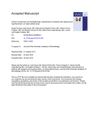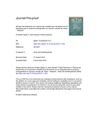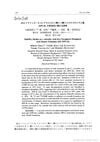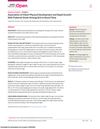 2 citations,
May 2018 in “Journal of The American Academy of Dermatology”
2 citations,
May 2018 in “Journal of The American Academy of Dermatology” Hypothyroidism patients with hair loss typically have thinning hair, smaller hair follicles, and normal hair shedding.
 3 citations,
March 2015 in “Journal of the European Academy of Dermatology and Venereology”
3 citations,
March 2015 in “Journal of the European Academy of Dermatology and Venereology” Some people with primary cicatricial alopecia also have inflammatory bowel disease, suggesting a possible connection.
5 citations,
April 2023 in “Pharmaceuticals” The new delivery system improved hair growth in alopecia treatment.
 3 citations,
May 2020 in “Actas Dermo-Sifiliográficas”
3 citations,
May 2020 in “Actas Dermo-Sifiliográficas” PRP injections increased hair density in men with hair loss but didn't work for everyone and more research is needed.
 3 citations,
July 2022 in “Problemy èndokrinologii”
3 citations,
July 2022 in “Problemy èndokrinologii” Metformin, a diabetes drug, may also help fight cancer, but more research is needed to understand how.
 2 citations,
September 2022 in “Scholarly journal of otolaryngology”
2 citations,
September 2022 in “Scholarly journal of otolaryngology” Epipharyngeal Abrasive Therapy helps reduce symptoms in Long COVID patients with chronic epipharyngitis.
 February 2023 in “Molecules”
February 2023 in “Molecules” Cactus extract from Notocactus ottonis may help promote hair growth.
 2 citations,
July 2012 in “InTech eBooks”
2 citations,
July 2012 in “InTech eBooks” People with alopecia areata often have thyroid autoimmunity.
 2 citations,
March 2022 in “Applied sciences”
2 citations,
March 2022 in “Applied sciences” Lespedeza bicolor extract promotes hair growth and increases hair follicle cell growth, potentially making it a better treatment than minoxidil.
 30 citations,
December 2014 in “Toxicological Research”
30 citations,
December 2014 in “Toxicological Research” Peppermint oil can effectively promote hair growth without being toxic.
 4 citations,
April 2012 in “Our Dermatology Online”
4 citations,
April 2012 in “Our Dermatology Online” The conclusion is that PCOS is a common cause of hirsutism in young obese women, and early treatment is important to reduce the risk of metabolic syndrome.
 4 citations,
September 2020 in “BioMed Research International”
4 citations,
September 2020 in “BioMed Research International” Timosaponin BII, a plant extract, was found to promote hair growth in mice, similarly to minoxidil.
 2 citations,
May 2017 in “International journal of reproduction, contraception, obstetrics and gynecology”
2 citations,
May 2017 in “International journal of reproduction, contraception, obstetrics and gynecology” Myoinositol helps improve menstrual cycles and some skin issues in women with PCOS.
 4 citations,
January 1994 in “Yakugaku zasshi”
4 citations,
January 1994 in “Yakugaku zasshi” EPC-K is stable except at very acidic pH or when exposed to sunlight, and it can decompose in low ethanol concentrations.
 2 citations,
January 2004 in “Elsevier eBooks”
2 citations,
January 2004 in “Elsevier eBooks” Lupus affects the skin in various ways, and proper skin examination is crucial for diagnosis and treatment.
 134 citations,
January 2010 in “Biomedical research”
134 citations,
January 2010 in “Biomedical research” Low oxygen conditions increase the hair-growing effects of substances from fat-derived stem cells by boosting growth factor release.
3 citations,
March 2023 in “International journal of molecular sciences” Keratin protein production in cells is controlled by a complex system that changes with cell type, health, and conditions like injury or cancer.
3 citations,
October 2023 in “Cosmetics” Healthy lifestyle changes can significantly improve skin health as you age.
2 citations,
July 2022 in “BioMed Research International” Finasteride-loaded nanogels are effective, safe, and improve drug absorption through the skin.
 6 citations,
May 2021 in “JAMA network open”
6 citations,
May 2021 in “JAMA network open” Babies who gain weight quickly, especially in the first 3 months, may start puberty earlier.
 March 2018 in “Trends in Immunotherapy”
March 2018 in “Trends in Immunotherapy” Combining triamcinolone acetonide with immunotherapy can help regrow hair in some alopecia totalis patients.
 45 citations,
January 2020 in “International Journal of Molecular Sciences”
45 citations,
January 2020 in “International Journal of Molecular Sciences” Some natural compounds may help overcome drug resistance in certain cancers, but more research is needed.
 87 citations,
July 2018 in “Nursing Clinics of North America”
87 citations,
July 2018 in “Nursing Clinics of North America” PCOS is a common hormonal disorder in women, marked by symptoms like hair growth and menstrual issues, and requires personalized treatment.
5 citations,
February 2021 in “Gels” HYDRO DELUXE BIO hyaluronic acid hydrogel is compatible with skin cells, may reduce inflammation, promote blood vessel growth, and protect against oxidative stress, suggesting it could help revitalize hair follicles.
 3 citations,
December 2020 in “International Journal of Women's Dermatology”
3 citations,
December 2020 in “International Journal of Women's Dermatology” Scalp micro-wounding helps promote hair growth in female pattern hair loss.
 January 1997 in “Elsevier eBooks”
January 1997 in “Elsevier eBooks” Hair and nails are skin parts that develop early and serve protective and functional roles.
2 citations,
February 2018 in “Journal of bone oncology” Low-dose chemotherapy is safer, more effective, and cost-effective than surgery for treating bone lesions in children.
 1 citations,
September 2022 in “Pharmaceutics”
1 citations,
September 2022 in “Pharmaceutics” The stiffness of a wound affects hair growth during healing, with less stiff areas growing more hair.
 4 citations,
October 2021 in “Journal of Cellular and Molecular Medicine”
4 citations,
October 2021 in “Journal of Cellular and Molecular Medicine” White blood cells and their traps can slow down the process of new hair growth after a wound.
 3 citations,
June 2021 in “PLOS ONE”
3 citations,
June 2021 in “PLOS ONE” A topical BRAF inhibitor, vemurafenib, can speed up wound healing and promote hair growth, especially in diabetic patients.























